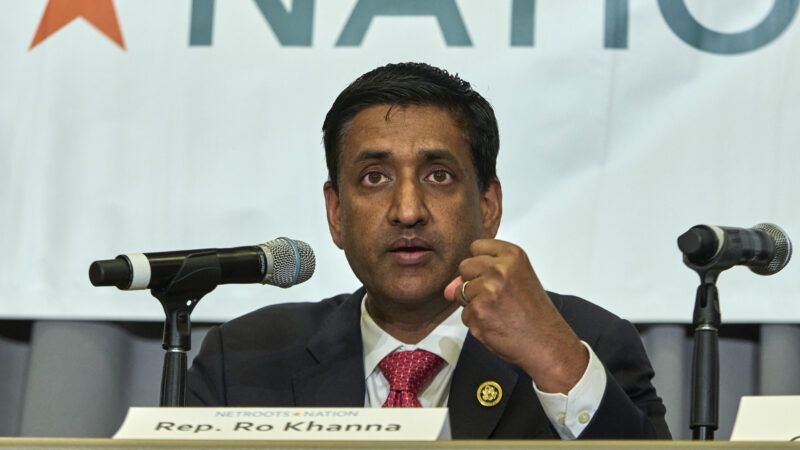The SAFE SEX Workers Study Act, a Bill Aimed at Ultimately Repealing FOSTA, Is Back
The bill is meant as a first step toward repealing FOSTA, the 2018 law that amended Section 230 and criminalized hosting adult ads.

Rep. Ro Khanna (D–Calif.) and Sen. Elizabeth Warren (D–Mass.) have reintroduced the SAFE SEX Workers Study Act. It aims to study the effects of FOSTA, a 2018 law that targeted online content promoting sex work.
FOSTA—formally known as the Allow States and Victims to Fight Online Sex Trafficking Act—weakened Section 230 of federal communications law (the "internet's First Amendment") and criminalized the hosting of online ads that facilitate prostitution. Since FOSTA's passage more than six years ago, entities from sex worker rights groups to academic researchers to the Government Accountability Office have called into question its efficacy. Meanwhile, sex workers and civil liberties groups—including the Woodhull Freedom Foundation and Human Rights Watch—charge FOSTA with promoting censorship and chilling free speech online.
The SAFE SEX Workers Study Act is meant to be a first step toward FOSTA's ultimate repeal.
You are reading Sex & Tech, from Elizabeth Nolan Brown. Get more of Elizabeth's sex, tech, bodily autonomy, law, and online culture coverage.
I talked to Khanna about the bill the first time it was introduced in 2019. "What [FOSTA] did was draconian," he said then. "It did not just go after bad actors; it went after sex workers' livelihood and safety."
Khanna said he initially wanted to introduce a repeal bill but was worried that it wouldn't pass. So, instead, he introduced a bill to "get data in terms of what the impact is on sex workers," in the hopes that hard data could convince others in Congress to support repeal.
"Just like in the war against drugs, that we were able to push back—particularly on marijuana convictions—based on many studies and data, the hope here is that once we have this data, it will convince people that FOSTA/SESTA was an overreach and then we will have a consensus to repeal it," Khanna told Reason in 2019.
Warren introduced a companion bill in the Senate in early 2020, and both the Khanna and Warren versions were reintroduced in 2022. Khanna's first attempt got 19 co-sponsors, and his second attempt got 13 co-sponsors. But in both houses in which it was introduced previously, the SAFE SEX Workers Study Act failed to go anywhere.
Now it's back, introduced in both the House and the Senate on December 17 (which sex workers commemorate as the International Day to End Violence Against Sex Workers). The Senate version already has three co-sponsors: Sens. Ron Wyden (D–Ore.), Cory Booker (D–N.J.), and Bernie Sanders (I–Vt.). The House version already has seven co-sponsors.
Once again, the bill directs the Department of Health and Human Services to study the impact of FOSTA on sex worker interactions with law enforcement, mental health, working conditions, and more, as well as the way the law curbed access to important tech resources, including social media and banking tools.
It also directs the Department of Justice to investigate how FOSTA impacted human trafficking investigations and prosecutions.
"Woodhull urges members of Congress to take the opportunity presented by the SAFE SEX Workers Study Act to investigate not only the consequences of SESTA/FOSTA on the health and safety of sex workers and survivors of trafficking but also free speech more broadly," said Woodhull President and CEO Ricci Joy Levy.
Sex workers and academics have already been compiling data on the effects of FOSTA. But having government agencies compile their own data might go a longer way toward convincing lawmakers of FOSTA's negative impacts.
Sadly, the bill seems mostly symbolic this time around. Even if it could get enough votes (and that seems like a long shot in itself), there's such a short time left in the 118th Congress. And if it's to go anywhere next year, Khanna and Warren would have to reintroduce the bill for the 2025–26 congressional term.
With former President Donald Trump—who signed FOSTA into law—soon to take office again and Republicans soon to control both houses of Congress, the chance of the SAFE SEX Workers Study Act going anywhere then seems even less likely.
Why bother to cover this likely doomed measure at all? Because it's still a good sign, I think, that Khanna and Warren haven't let this go and that the measure is still able to attract some co-sponsors right off the bat. It's encouraging to know that at least some people in Congress have doubts about FOSTA and are willing to publicly express those doubts.
It's a very, very small good sign, to be sure. And I'm skeptical that political skepticism surrounding FOSTA will translate to future caution concerning other bills to amend Section 230, or other bills that purport to be about stopping sex trafficking. But the fact that there's any skepticism at all speaks to the power of grassroots action against FOSTA specifically and online censorship of sex workers broadly and stands as a testimony to the hard work that activists—largely composed of sex workers, sex worker rights groups, and LGBTQ groups—have done to raise awareness about FOSTA's harms.
More Sex & Tech News
• TikTok is asking the Supreme Court to take up its case, after a federal appeals court denied its request to stay a law that would, in effect, ban the platform.
• Against government-controlled digital currencies
• A new paper looks at how Amazon fulfillment centers can benefit local economies. "I find Amazon's entry in a metro [area] increases the total employment rate by 1.0 percentage points and average wages by 0.7 percent," writes University of Minnesota Ph.D. candidate Evan Cunningham. "The composition of employment shifts from retail and wholesale trade to warehousing and tradeable services, primarily driven by younger workers. Employment gains are concentrated among non-college workers."
• Has artificial intelligence hit a wall? "Improvements are slowing and artificial general intelligence remains far off," notes Persuasion. "Companies that have based their business models and valuations on continued exponential improvements may need to substantially revise their expectations and adapt their strategies as the limitations of current approaches become clearer," Nick Potkalitsky writes.
Today's Image



Show Comments (10)